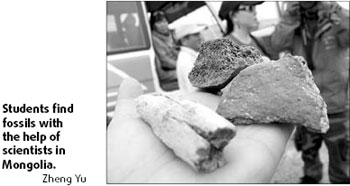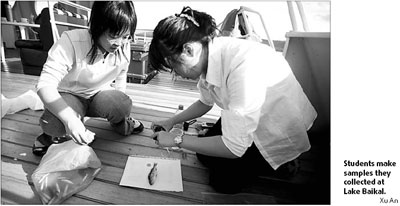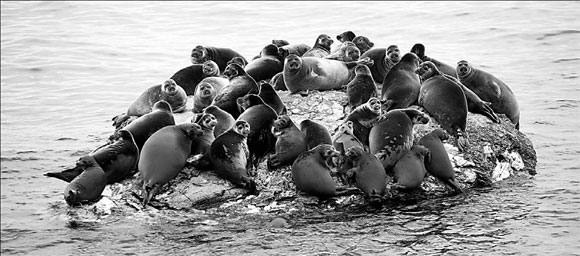Seal of approval
|
Lake Baikal is the habitat for a large crowd of freshwater seals. Xu An |
Li Zheyuan's school friends gather around their excited buddy and hear a tale of 90 seals sunbathing together on a rock in a lake in Russia. Compared with his friends, Li had a very cool summer holiday and was eager to share his adventures.
"The seals looked peaceful and harmonious like a big family," Li tells his dorm roommates, who have only seen it on TV. "They were so close to me that I just wanted to play with them and watch them jump into the lake one after another."
"Lake?" a listener interrupts. "Isn't a seal a sea animal?"
"Yes," Li explains. "But Lake Baikal is the habitat for a large crowd of freshwater seals.
"It is still a mystery how they came to the lake and settled down."
Li is not giving a presentation in a science class. It is the first day of September, which marks the new term of almost all Chinese schools.
It is a frustrating day for many students, who find it painful to drag themselves out of the leisurely pace of summer holiday. For Li, it is a chance to showcase his excellent adventure.
Li's anecdotes definitely draw a lot of jealous eyes. Not only because he went abroad, but he also explored the famous "dinosaur graveyard" in Mongolia and Lake Baikal in Russia, two marvelous, yet isolated destinations for most regular tourists.
Li, a high school student from Xiamen, East China's Fujian Province, joined an investigation team initiated by the Science & Education Program Center of China Central Television (CCTV). Led by scientists, the team traveled across three countries from August 13 to 24, driving through the stunning Gobi Desert and reaching the beautiful vast forests of Siberia.

Li was one of the six lucky students - four from the mainland and two from Taiwan - who stood out after three rounds of selection from nearly 10,000 online applicants aged between 16 and 20.
All the final entrants had solid backgrounds in science. Li had taken part in research on water ecosystems with college teachers and chemistry students.
However, Li says nothing compares with his recent 10-day tour.
The team drove southward after they landed in Ulan Bator, in the Mongolian people's Republic. The students were divided into two competing units in a series of tasks en route.
"At first, we could see lush grassland. Then it gradually changed to clusters of grass," Liu says. "And finally there were only exposed sands and stones, which implied that we had entered the Gobi Desert.
"The view was phenomenal, especially for teenagers from cities in mild southern China like me."
He didn't expect magnificent landscapes when they arrived at the "dinosaur graveyard".
Liu Xuan, from Li's opposing team, says he was shocked by what he saw.
"Nothing. No trees but bumps and hollows," says the sophomore from a police school in North China's Hebei Province.
He stood near the edge of the cliff, where he got a panoramic view of the valley. The land was reddish brown. "No wonder it is also dubbed 'Flaming Cliffs'," Liu recalls.
The area stunned the scientific world because of its rich troves of dinosaur remains discovered by Roy Chapman Andrews, a paleontologist of the United States, in the 1920s. Chapman nicknamed the site "Flaming Cliffs" for the rocks' surreal glowing orange color.
The two teams competed to find fossils first under the help of scientist directors. Li and his teammates climbed onto the cliff. They searched for dark red areas where they might find fossils but failed. Liu's team tried another approach. They dug into flat ground that had water traces and found several worm trace fossils.
"I was so excited. I didn't expect to find anything, for there have been continuous influx of archaeological teams," Liu says.
"I have always seen the archaeological excavation as a divine profession. It shouldn't be so easy. We were lucky."
Their exploration in Lake Baikal brought a lot of pleasure. It is the home to an enormous variety of plants and animals, and some are found nowhere else in the world, such as the freshwater seals.
A wire netting protects the seals, however the public can still get close and observe this rare species. "They were merely 20 meter away from us," Liu says.
"The baby seals were very cute and quiet. They looked at us alarmingly, and a tiny movement would scare them away."
Li strongly recommends future visitors to taste the lake water. "The lake is crystal clear. It tastes cool and sweet," he says.

The students collected a lot of plant and insect samples, which they will make a comparison with other samples they took in the grassland and the Gobi Desert.
The work will help each student finish an assigned thesis on the exploration.
Their theses will be on display, together with the fossils, plant and insect samples they collected and photos recording the whole journey, in an exhibition in October or November in Beijing.
A documentary about the exploration will be broadcast on CCTV's science and education channel (Channel 10) during the National Day holiday.
Qu Xiangdong, a CCTV host who initiated the activity, believes that such activities enable students to get closer to science through personal experience, and helps popularize the thirst for knowledge in a vivid way.
When they stopped in Irkutsk, the second biggest city in Russia, the students were assigned a task to teach two locals to speak simple Chinese words. It seemed almost an impossible mission because most locals don't even speak English.
Liu's group acted rather aggressively and failed to gain locals' trust.
Li's team tried a different tact. The teams' female member stopped a woman and tried to communicate with her by body language. And the two boys demonstrated speaking and imitating. The woman understood that they wanted her to repeat Chinese after them and did it.
Qu says it was a test of judgment, decision-making and the ability to work in a team, a skill many young people from single-child families lack.
Sun Keqin, professor with the Beijing-based China Geology University, was also the scientific director for the trip.
He is envious that today's students can carry out exciting scientific explorations abroad. Back in the 1970s, his generation didn't have such rare opportunities.
Sun helped the students a lot in terms of geology and paleontology.
"They are brave, positive, united and also, very cute and interesting. It is an important practice to deepen their love for nature," he says.
The parents are also happy with their children's adventure.
"We encouraged him to relax and enjoy the selection process. He wanted to win so much that he was overcautious and didn't show his best," says Li Wencong, Li Zheyuan's mother.
"He talks a lot about the good qualities of his teammates and the wisdom and personal charms of the scientists after he got back," she adds.
Liu says he finally knew what is science in the process of fossil digging.
"Every time we found a fossil and handed it to our scientist director, he would examine it carefully.
"We dug a lot of bone-like stones and he turned us down several times before we found the real trace fossils.
"I think science is a spirit of precision and persistence. We may not become great scientists in the future. But such a spirit will cast its light on our long journey of life," he says.
(China Daily 09/12/2007 page21)















